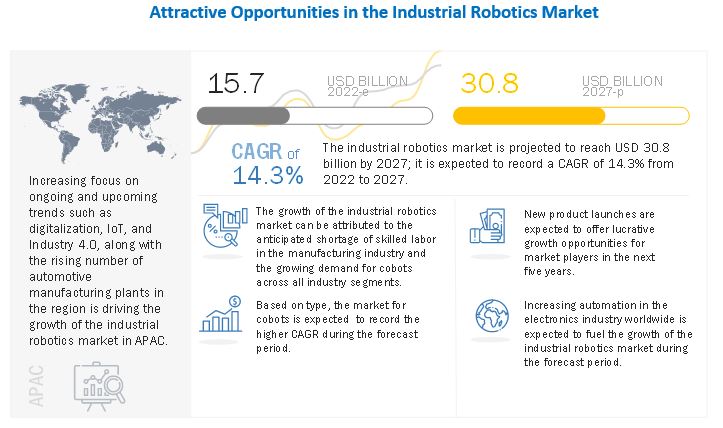ASIA ELECTRONICS INDUSTRYYOUR WINDOW TO SMART MANUFACTURING
Japan Industrial Robotics Market to Grow 45.5% from 2002-27
The Japan industrial robotics industry is poised to grow 45.5% CAGR from 2022 to 2027. This figure was based on the market research by MarketsandMarkets titled Japan Industrial Robotics Market by Type (Traditional, Collaborative Robots), Component, Payload, Application (Handling, Processing), Industry (Automotive, Food & Beverages) and Region (North America, Europe, APAC, RoW) – Global Forecast to 2027″.

Rise in Aging Population to Boost Demand for Industrial Robots
Japan is one of the leading producers of electric vehicles in the world. Specifically, the arrival of fully electric and hybrid cars in the coming years will boost the industrial robotics market due to new assembly line processes. Meanwhile, the decline in consumer electronics products is due to fierce competition from global manufacturers in China and South Korea. However, there will be high demand for electronic components such as sensors and displays in the export market. With FANUC (Japan) and Yaskawa (Japan) as the top players in the industrial robotics market, Japan’s global industrial robots industry is expected to grow steadily.
Potential massive automation in Japan is possible. Primarily, this is due to the growing senior population. However, the aging population in the country makes labor costly. This increases the demand for industrial robots. According to the International Monetary Fund, Japan’s domestic labor force (aged 15 to 64) is projected to decline even faster than the overall population, dropping by 24 million between 2017 and 2050.
Moreover, the Population Division of the UN Department of Economic and Social Affairs released an estimate for Japan indicating that its population would dip below 100 million shortly after the middle of the 21st century. Specifically, Japan is expected to lose 34% of its current population by the end of the century.
According to the International Organization of Motor Vehicle Manufacturers, Japan was the fourth-largest manufacturer of commercial vehicles in 2018. Also, it has one of the largest electronics manufacturing industries in the world.
Meanwhile, according to the Information Technology & Innovation Foundation, Japan has strong government policies to promote robotics; for example, it provides accelerated depreciation on new equipment.




